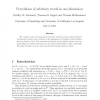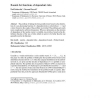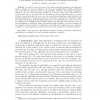5 search results - page 1 / 1 » Percolation of arbitrary words in one dimension |
RSA
2010
13 years 3 months ago
2010
We consider a type of long-range percolation problem on the positive integers, motivated by earlier work of others on the appearance of (in)finite words within a site percolation...
FS
2006
13 years 4 months ago
2006
Abstract The problem of finding the best-possible lower bound on the distribution of a non-decreasing function of n dependent risks is solved when n = 2 and a lower bound on the co...
SIAMNUM
2010
12 years 11 months ago
2010
A straightforward discretisation of problems in d spatial dimensions often leads to an exponential growth in the number of degrees of freedom. Thus, even efficient algorithms like ...
FOCS
1991
IEEE
13 years 8 months ago
1991
IEEE
We wish to increase the power of an arbitrary algorithm designed for non-degenerate input, by allowing it to execute on all inputs. We concentrate on in nitesimal symbolic perturba...
STOC
1993
ACM
13 years 8 months ago
1993
ACM
In this paper we study quantum computation from a complexity theoretic viewpoint. Our first result is the existence of an efficient universal quantum Turing machine in Deutsch’s...



